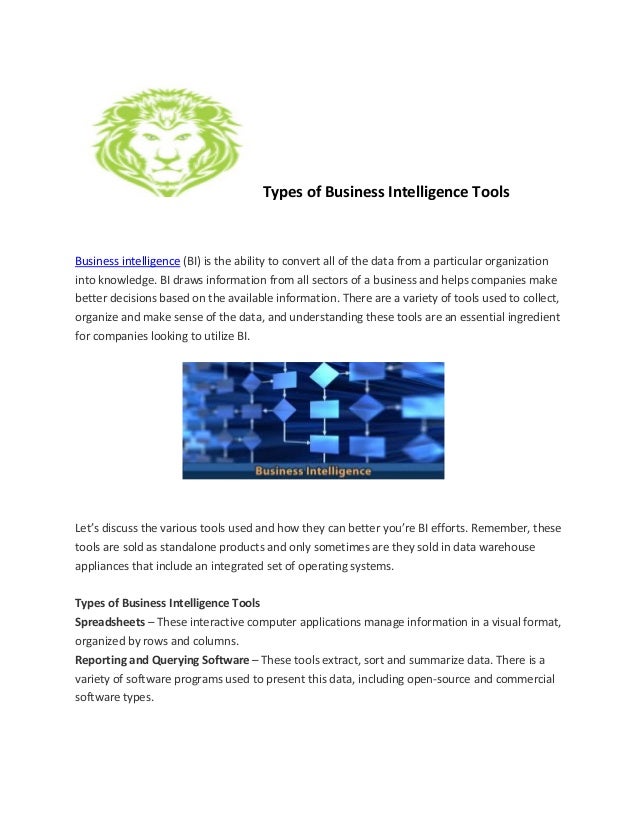Business intelligence tools are software programs and features that are used to complete detailed data analysis. The term 'business intelligence' is used to describe computer software that is used to identify patterns and trends in large data sets. There are a range of business intelligence tools available in the commercial software market, and selecting the correct solution requires a good understanding of reporting requirements and long-term business needs.
List of some popular Online Analytical Processing (OLAP) Tools: Business intelligence is growing by leaps and bounds in the current scenario. The predictive analytics market is expected to grow to 10 billion in next 3/4 years. Business intelligence (BI) tools have given companies of all sizes access to powerful data analysis capabilities. Receiving insights and finding trends is essential for businesses to scale and adapt as the years go on, which is exactly what a business intelligence system does. Business intelligence (BI) tools are types of application software that collect and process large amounts of unstructured data from internal and external systems, including books, journals, documents, health records, images, files, email, video, and other business sources. Smart business, driven by good choices The Looker platform is designed to give everyone the power to discover the answers they need to sophisticated questions. Give teams the BI tools they need to have a deeper impact and create better outcomes.
There are three types of business intelligence tools: data extraction, data architecture and query development. All four types of tools are included as standard features in most business intelligence software products. The skills required to utilize these tools effectively include data management, intermediate computer skills and prior statistics training. Business intelligence is an area that has experienced growth and and is expected to keep growing.
Business intelligence systems are either built into an enterprise resource planning (ERP) system or function as independent computer applications. In order to utilize business intelligence software, the data from the transactional system must be made available to the software. This usually is achieved through the use of an extract, transform and load (ETL) tool, which is programed to select data that matches a specific criteria and ensure data consistency before loading it into the business intelligence solution.
Data architecture is the process of designing internal tables and data structures. This is one of the more important tools, because a well-designed system can expand capacity and grow to meet changing needs. A user interface provides the architect with the tools necessary to create and maintain these tables.
The purpose of business intelligence tools is to enable a range of forms of analysis that would not otherwise be possible. Options include creation of ad hoc, scheduled and standard reports across a range of disciplines. The functionality required to create these reports is an essential part of the application. Query development requires a combination of technical skills and a solid understanding of business process.
The very best tools are useful only in the hands of skilled staff members. The primary requirements for a position in business intelligence include post-secondary training in statistics, advanced mathematics or computer systems. Many employers expect a graduate degree in statistics or mathematics for management roles.
Business intelligence products are constantly changing, and a commitment to continuing education is necessary to be successful in this type of work. An employee can keep his or her skills current through online courses, seminars and discussions. These skills can be used to help evaluate the merits and potential applications of business intelligence tools.
Business intelligence software is a type of application software designed to retrieve, analyze, transform and report data for business intelligence. The applications generally read data that has been previously stored, often - though not necessarily - in a data warehouse or data mart.
History[edit]
Development of business intelligence software[edit]
The first comprehensive business intelligence systems were developed by IBM and Siebel (currently acquired by Oracle) in the period between 1970 and 1990.[1][2] At the same time, small developer teams were emerging with attractive ideas, and pushing out some of the products companies still use nowadays.[3]
In 1988, specialists and vendors organized a Multiway Data Analysis Consortium in Rome, where they considered making data management and analytics more efficient, and foremost available to smaller and financially restricted businesses. By 2000, there were many professional reporting systems and analytic programs, some owned by top performing software producers in the United States of America.[4]
Business Intelligence
Cloud-hosted business intelligence software[edit]

In the years after 2000, business intelligence software producers became interested in producing universally applicable BI systems which don’t require expensive installation, and could hence be considered by smaller and midmarket businesses which could not afford on premise maintenance. These aspirations emerged in parallel with the cloud hosting trend, which is how most vendors came to develop independent systems with unrestricted access to information.[5]
From 2006 onwards, the positive effects of cloud-stored information and data management transformed itself to a completely mobile-affectioned one, mostly to the benefit of decentralized and remote teams looking to tweak data or gain full visibility over it out of office. As a response to the large success of fully optimized uni-browser versions, vendors have recently begun releasing mobile-specific product applications for both Android and iOS users.[6] Cloud-hosted data analytics made it possible for companies to categorize and process large volumes of data, which is how we can currently speak of unlimited visualization, and intelligent decision making.
Types[edit]
The key general categories of business intelligence applications are:
- Reporting and querying software: applications that extract, sort, summarize, and present selected data
- Online analytical processing (OLAP)
- Data warehouse[7]
- Data cleansing[8]
Except for spreadsheets, these tools are provided as standalone applications, suites of applications, components of Enterprise resource planning systems, application programming interfaces or as components of software targeted to a specific industry. The tools are sometimes packaged into data warehouse appliances.
Open source free products[edit]
- Apache Hive, hosted by the Apache Software Foundation
- BIRT Project, by the Eclipse Foundation
Business Intelligence Tools Swot
Open source commercial products[edit]

- JasperReports: reporting, analysis, dashboard
- Palo: OLAP server, worksheet server and ETL server
- Pentaho: reporting, analysis, dashboard, data mining and workflow capabilities
- TACTIC: reporting, management, dashboard, data mining and integration, workflow capabilities
Proprietary free products[edit]
Business Intelligence Tools Free
Proprietary products[edit]
- GoodData - cloud-based
- Microsoft
- Oracle
- Pentaho (now Hitachi Data Systems)
- Qlik
- SAP NetWeaver Business Intelligence
- Spotfire (now Tibco)
- Sybase IQ (now SAP IQ)
- Zoho Analytics (as part of the Zoho Office Suite)
References[edit]
- ^'History of Business Intelligence Software'. business-intelligence.financesonline.com. Retrieved 28 October 2018.
- ^'A Detailed Look At The History Of Business Intelligence Software'. comparecamp.com. Retrieved 28 October 2018.
- ^'Integrating Oracle Business Intelligence / Siebel Analytics with Siebel CRM', oracle.com,.
- ^'Applied Multiway Data Analysis', onlinelibrary.wiley.com,.
- ^'Cloud BI: 5 Benefits of Cloud Business Intelligence', compudata.com,.
- ^'Mobile business intelligence brings benefits -- and barriers', searchbusinessanalytics.techtarget.com,.
- ^Exploring Data Warehouses and Data Quality Published by Spotless Data Retrieved 15 May, 2017]
- ^Exploring Data Analysis Published by Spotless Data Retrieved 15 May, 2017]
